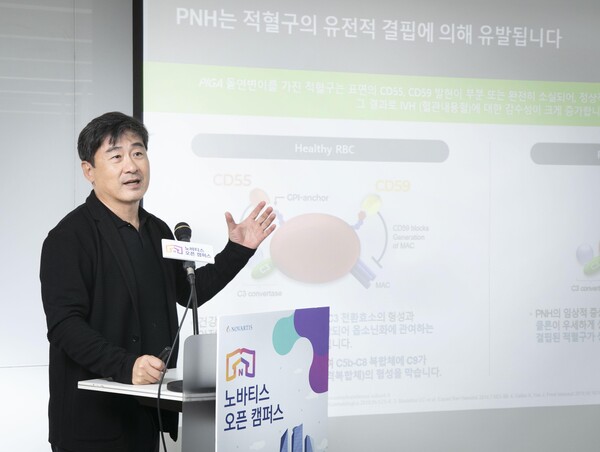Novartis's oral medication Fabhalta (ingredient: iptacopan) is emerging as a strong competitor in the paroxysmal nocturnal hemoglobinuria (PNH) market, currently dominated by AstraZeneca's intravenous treatments Soliris (ingredient: eculizumab) and Ultomiris (ingredient: ravulizumab).

The drug, which received approval in August in Korea, represents the first oral treatment option for PNH patients and demonstrates superior efficacy in addressing both intravascular and extravascular hemolysis.
PNH is a rare blood disorder where red blood cells are destroyed within blood vessels, leading to symptoms such as dark-colored urine and potentially life-threatening complications including acute kidney failure. While the global incidence is estimated at 1.5 cases per million people, East Asian countries, including Korea, China, and Japan, show higher prevalence rates. In Korea alone, the number of PNH patients has doubled from 260 in 2010 to 504 in 2023.
During a media class by Novartis Korea on Monday, Professor Jang Jun-ho of the Department of Hematology-Oncology at Samsung Medical Center, explained the severity of the condition.
"PNH is characterized by complement-mediated hemolysis, anemia, bone marrow failure, and thrombosis,” Jang said. “About 40 percent of patients develop blood clots, which is the leading cause of death in PNH patients."
Jang highlighted the limitations of existing C5 inhibitor treatments.
"While C5 inhibitors like Soliris and Ultomiris have improved PNH treatment by effectively controlling intravascular hemolysis, they cannot completely prevent extravascular hemolysis,” he said.
The impact on patients' quality of life is significant, according to Jang.
"Transfusion dependency severely affects patients' daily lives,” he said. “It takes over two hours just for the transfusion process, and when you add the time for C5 inhibitor administration, patients essentially lose an entire day.”
This represents a significant social and economic loss, especially for caregivers of elderly patients, he added.
In contrast, Iptacopan can be taken at home twice daily. Safety data shows no treatment-discontinuing adverse events, with reported side effects such as headache, nausea, and diarrhea typically resolving within a week.
Jang also noted that 75-89 percent of patients on C5 inhibitors experience fatigue, leading to higher hospitalization rates and cognitive impairment that substantially impacts their quality of life.
Fabhalta works by inhibiting Factor B in the complement alternative pathway, providing comprehensive control of both intravascular and extravascular hemolysis. Clinical trials have demonstrated impressive results.
The APPOINT-PNH study involving treatment-naive patients revealed that 92 percent of patients showed clinically significant hemoglobin increases, while 98 percent achieved transfusion independence.
The APPLY-PNH study, focusing on patients with prior C5 inhibitor experience, showed that 82.3 percent of patients achieved hemoglobin increases of over 2g/dL, and 95 percent overcame transfusion dependency.
During the media class, Jang shared his clinical experience with Fabhalta.
"My patients taking Fabhalta twice daily show normalized hemoglobin levels within one to two weeks, achieving a state comparable to healthy individuals,” he said. “The improvement is so dramatic that some patients may forget to take their medication because they feel so well."
As a result, Jang believes that the reimbursement landscape for PNH treatments in Korea may face significant changes.
Currently, existing treatments like Soliris and Ultomiris are covered by national health insurance, making them accessible to Korean patients.
Jang sees a clear path forward for Fabhalta's reimbursement.
"Given the compelling clinical evidence and patient convenience benefits, there's no reason Iptacopan shouldn't receive reimbursement approval if it's priced at a level similar to or below existing treatments,” he said.
Looking to the future, Jang is optimistic about Fabhalta's potential impact on treatment protocols.
"Combination therapy of C5 inhibitors with D-factor inhibitors hasn't shown significant advantages over Fabhalta monotherapy,” he said. “While Empaveli (ingredient: pegcetacoplan) has recently been approved as a subcutaneous injection, it requires twice-weekly 30-minute pump infusions, which presents its own challenges."
Given Fabhalta's improved convenience and efficacy, it should have no problems being approved for first or second-line treatment, Jang added.
Related articles
- Novartis' orphan drug wins approval to treat paroxysmal nocturnal hemoglobinuria
- PNH care faces a turnaround, but the new drug’s reimbursement remains an issue
- For years, a K-pop singer’s pain went unnamed. At a Novartis screening, he shared why.
- [ICKSH 2025] Paroxysmal nocturnal hemoglobinuria drug Empaveli targets extravasation hemolysis
- Korea green-lights Novartis’ Cosentyx for kids with severe psoriasis

